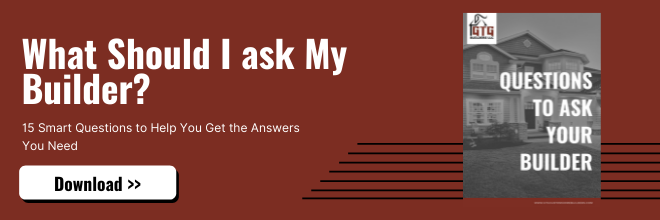3 Min Read
New Jersey Real Estate Tax: How Much Would You Pay?
Homeownership is a big financial responsibility, especially in New Jersey. With an average property tax rate of 2.44%, homeowners in the Garden State must plan carefully for their regular tax bills. Some homeowners choose to set aside money every month for their tax bill, while others pay their tax bills through their monthly mortgage payment.
Knowing what to expect before you purchase a home, what to expect after building a home, and other details about property taxes can help you be prepared for the bill that comes due four times per year.
Property Taxes in New Jersey
The average property tax payment in New Jersey is almost $8,000 annually, due in four installments on the first of February, May, August, and November. Just how much you'll pay for your property taxes in New Jersey depends on the area where you buy, the value of your home, features, and amenities in your home, and how much you paid for your home.
How Does It Get Paid?
Typically, lenders pay the property tax bill for the homeowner and incorporate the tax payment into the mortgage payment. If your lender does this for you, your property tax bill will become a natural part of your mortgage payment. Unless you pay close attention to your mortgage statement, you'll hardly notice the money you pay every month.
Even though the tax payment doesn't come from you, you may still receive a bill from your municipality. Forward this bill to your financial institution to ensure prompt payment.
How Can You Tell If Your Lender Is Paying It For You?
Your lender should be able to tell you when you buy the house whether your tax bill will be paid through your lending company. You'll also see a line item on your normal monthly mortgage payment detailing how much money is set aside for your tax bill annually.
Does Your Mortgage Payment Fluctuate If Your Tax Bill Fluctuates?
Yes, your mortgage company will estimate your tax bill every year and will change the amount they're requesting if your tax bill changes. You'll be required to pay your first year of property taxes at the close of escrow.
When you buy a new construction home, your property taxes will raise the second year that you own your home, because the value of the property will change once the house is built.
How Do Property Taxes Work in New Jersey?
Property taxes are determined by tax assessors who assign a value to the house. That value then determines the annual amount due. The tax is paid to the local government, which is set by municipalities, counties, and school districts. In some areas, taxes may also be increased for specific purposes, like parks and libraries.
Property Tax Relief Programs
Seniors paying property taxes may be eligible for a refund on property tax increases. Information about the Senior Freeze eligibility can be found on the New Jersey Division of Taxation website.
Budgeting For Your Property Tax Bill
If your mortgage lender does not set aside money every month for your tax bill, then it's up to you to set that money aside for yourself. Tax bills in New Jersey are big enough that it's important to start budgeting for property taxes from the first month that you move into your house.
Start by contacting your local assessor's office to find out how much you can expect to pay for your taxes in the coming year. Remember that your taxes will likely be higher the second year after your new construction home is built because the bill in your first year will be based on the value of the property before it was improved with a house. Your tax assessor will take a little time to come see your home and assess it based on the house you've built.
Confirm this with your local government offices, then plan accordingly. Set aside enough money each month that you'll have the proper amount saved when the tax bill comes due. Taxes can change quickly, as more money is needed for various local services. Keep up with local ballot measures that could increase or decrease taxes, and make adjustments to the amount of money you're setting aside each month.
.jpeg?width=1000&height=664&name=Beach%20houses%20along%20the%20inlet%20in%20Point%20Pleasant%20Beach%2c%20New%20Jersey.%20(1).jpeg)
How Can You Keep Property Taxes Low In New Jersey?
Keeping property taxes low in New Jersey is very difficult because the entire state has relatively high property taxes overall. However, some counties are more expensive than others. If keeping your property taxes low is a priority, find out which counties have lower tax rates and look to those counties when choosing a lot to build your new construction home.
Keep in mind that county taxes go toward important services, like schools. Choosing a county based on taxes, and seeking a county with a lower rate may mean that the schools and other government series in your area may not be as good as services in counties with higher tax rates.
If you feel that your home is unfairly taxed at a high rate and that your home is valued at an inaccurately high amount, then you have the ability to appeal the value of the home as determined by your assessor. You'll have to go through a formal appeal process. Pay your property tax bill even as you're appealing the amount due. If it is determined that the value of your house is unfairly high, you'll be issued a reimbursement. If you haven't paid your property tax at all, your case may be thrown out.
Building a Custom Home in New Jersey? Contact GTG Builders LLC
Building a custom home in New Jersey is a rewarding process if you work with an experienced professional. Contact GTG Builders LLC to find out more about how to build a custom home in New Jersey.





.png?width=352&name=Rebuilding%20Your%20Home%20After%20an%20Insurance%20Claim%20(1).png)
![Property Taxes in New Jersey [And Why it Matters]](https://www.gtgcustomhomebuilders.com/hs-fs/hubfs/Property%20Taxes%20in%20New%20Jersey%20%5BAnd%20Why%20it%20Matters%5D.png?width=352&name=Property%20Taxes%20in%20New%20Jersey%20%5BAnd%20Why%20it%20Matters%5D.png)
